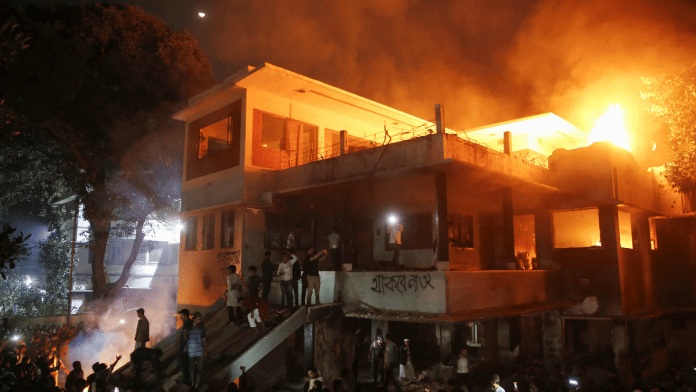We learn from history that we do not learn from history. Nowhere does this adage hold truer than in the bloodied history of the Indian subcontinent. As a mob tore down Dhanmondi 32, Dhaka’s most famous address, where Bangabandhu Sheikh Mujibur Rahman lived and fell to assassins’ bullets along with most of his family members, Bangladesh erased its birth story.
The Daily Star reported that an event titled “Bulldozer Procession” was scheduled for 9 pm on Wednesday, coinciding with an online programme where deposed prime minister Sheikh Hasina was to address her followers. “Hundreds of protesters stormed the building and began taking it apart with shovels and hammers around 8:00pm, an hour before the planned procession,” the report said.
All that remains now is a pile of rubble as people removed doors, windows, bricks, iron rods, and pipes from the wreckage. While the Muhammad Yunus administration will have to bear the blame for failing to stop the carnage, the genesis of what we are witnessing today in Bangladesh is not August 2024, when Hasina fled her country after the students’ quota protest became a rallying cry for her ouster. It is 1971 when Hasina’s father Sheikh Mujibur Rahman pardoned those who opposed not just him but the very idea he fought for: Bangladesh.
Also read: India has disproportionately benefited from Bangladesh. Yunus govt is balancing that
Tortured history, terrible mistakes
In 1971, East Pakistan became Bangladesh over language and culture, Bangla over Urdu, ethnicity over religious identity. Bangladesh was birthed after eight months, two weeks, and six days of mass murders, deportations, and genocidal rape of East Pakistani Bengali-speaking population by the West Pakistan army under the orders of General Agha Muhammad Yahya Khan. The counteroffensive mounted by the homegrown guerilla force Mukti Bahini, armed and trained by the Indian Army, which later joined the war, changed the geopolitical landscape of the region. Bangladesh was born on the corpses of three million Bengalis.
It was not just the West Pakistan army that was responsible for this genocide. East Pakistani collaborators known as Razakars, who were mostly Urdu-speaking migrants who had moved to East Pakistan from India during the Partition, were part of an auxiliary force created by the Pakistani military to support its operation, according to Ali Usman Qasmi, a historian at the Lahore University of Management Sciences.
“The army needed local support. The student wing of the religio-political party Jamaat-e-Islami in East Pakistan provided them with men who believed that they must support the army,” Qasmi said in an interview.
When it could smell defeat, the West Pakistan army, along with Razakars, allegedly rounded up close to 200 Bengali intellectuals, artists, journalists, and academics, and shot them.
But this venom that wanted to kill the very idea of Bangladesh was allowed to remain in the country’s bloodstream. In an interview last year, Abhijit Dasgupta, former Director General, Doodarshan Kendra, Kolkata, who covered the war in Bangladesh, said that soon after the birth of Bangladesh in 1971, Sheikh Mujibur Rahman gave clemency to those who were pro-Pakistan, which is the root of all problems now.
It is not just clemency to those who opposed the idea of Bangladesh, but Mujib’s secularism, it has often been argued, that had its limits. And though Bangladesh was formed in order to keep culture over religious identity, many policies of the Mujib government upheld Islamic cultural values in state affairs.
Bangladesh expert Mubashar Hasan wrote that Mujib banned gambling and selling of alcohol in Bangladesh, and closed cinema halls on the Prophet’s birthday. “(His government) established an organisation that was the forerunner of the Islamic Foundation, a state-funded Islamic missionary organisation, and reformed the Madrasah education board. In 1974, Bangladesh poet Daud Haider was forced out of the country for offending religious sentiments through one of his poems,” Hasan wrote.
Mujib’s flirtations with religiosity continued to afflict Bangladesh’s body politic much after his death. Even his daughter, Sheikh Hasina, who had mounted a spirited campaign against terror during her reign failed to finish off both radical Islam and the pro-Pakistan sentiment that is out there on the streets today.
In an interview to ThePrint on 25 July 2023, former Bangladesh Home Minister Asaduzzaman Khan had said the defeated forces of the Liberation War in 1971 have not retreated yet from Bangladesh. “They want to mar the spirit of the Liberation War. They are repeatedly trying to destroy religious harmony,” he said.
We can blame Muhammad Yunus for failing to stop the destruction of the house of Mujib. But the fault of Bangladesh’s shaky secular foundations goes way back in time.
Deep Halder is an author and journalist. He tweets @deepscribble. Views are personal.
(Edited by Aamaan Alam Khan)






